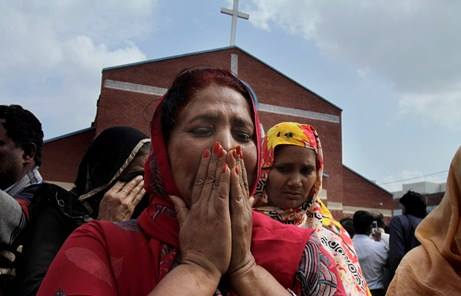Pakistani Christians 'fasting and praying' against unrest and violence
AsiaNews publishes a reflection for the Lenten season by a Capuchin friar from Lahore. The situation in the country mirrors "the negative impact" of global conflicts and general tension. Prayer "a glimmer of hope" in the midst of chaos. The renunciation of food a practice that "brings one closer to God". Almsgiving a material representation of mercy.
Lahore (AsiaNews) - In a world often divided by global conflicts and tensions, Pakistan's current situation is a distressing practical representation of the negative impact that wars have on international peace and harmony. This South Asian country, embroiled in global wars, has had its share of difficulties in maintaining stability and finding comfort in the face of hardship.
The power of prayer (Matthew 7:7)
For the people of Pakistan, Christian prayers are a glimmer of hope and strength in the midst of chaos. Christian prayers are more than just words spoken in space; they are a channel to the supernatural and a way to ask for comfort, direction and help from an infinite being. Both individuals and communities can find the courage to persevere and overcome obstacles precisely through prayer.
Christian prayers provide comfort and firmness in times of turmoil. Believers believe that prayer can repair broken relationships, be a source of miracles and bring peace. Through prayer, they gain the strength to persevere in faith in the face of suffering.
The spiritual discipline of fasting (Matthew 6:16-18)
Another significant habit with strong roots in Christianity is fasting. This is a renunciation of eating, or certain foods, for a specific period of time, often combined with prayer and meditation. Fasting is a spiritual activity that helps people get closer to God and strengthens their resolve in the current situation in Pakistan.
Fasting becomes a means of demonstrating commitment and pursuing spiritual sustenance in times of chaos and conflict. By denying themselves material food, Pakistani Christians shift their focus to the spiritual world, acknowledging their dependence on God and asking for His guidance. Fasting is seen as an approach to gaining clarity and understanding in the midst of turmoil and as a way to purify oneself both physically and spiritually.
Extend compassion and charity (Luke 12:33)
Philanthropy and almsgiving take on a unique significance in a country struggling with the effects of poverty, social inequity, and violence. Christian teachings place a strong emphasis on showing compassion and providing for the disadvantaged. Almsgiving is an act of altruism and compassion, a means of healing suffering and promoting social justice, and transcends mere monetary offerings.
Christians in Pakistan practice a number of acts of almsgiving, including giving the less fortunate access to food, housing, healthcare and education. These acts of kindness not only meet present needs, but also strengthen bonds of community cooperation. They provide people affected by war with hope and support, acting as a material representation of God's mercy and love.
Contributing to peace and harmony (Matthew 5:9)
The pursuit of peace and harmony is made possible by Christian prayers, fasting, and almsgiving in a war-torn nation. Individuals and communities gain perseverance, inner strength, and a new sense of purpose through these activities. They practise necessary qualities - such as forgiveness, compassion and selflessness - to foster mutual understanding and bridge inequalities.
Moreover, the influence of these Christian traditions continues to be evident outside Pakistan. They serve as an inspiration for people around the world to uphold the principles of justice, love and peace. By living by these values, Pakistani Christians transform communities and promote the larger goal of peace and harmony in the world, acting as agents of positive change and sources of hope.
Conclusion
In the midst of unrest and violence in Pakistan, Christian practices such as fasting, prayer and almsgiving offer a glimmer of hope. These traditions of the Lenten season support the ultimate goal of peace and harmony, as well as providing comfort and strength to individuals and communities. Christians in Pakistan demonstrate how firm their faith is and how strong their dedication to changing the world by participating in acts of charity, fasting and prayer. Their story serves as a reminder of the transformative power of Christian spirituality and its ability to manifest itself even in the most difficult situations.
* Capuchin friar of the archdiocese of Lahore
(Shafique Khokhar collaborated)
07/02/2019 17:28







.png)












